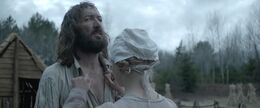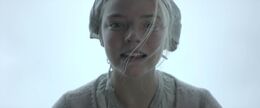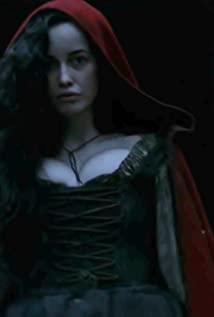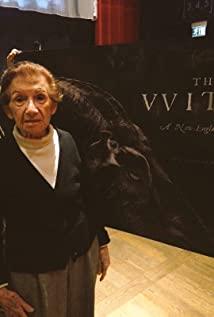But The Witch is not. The rare sincerity makes such a subject cut into a serious theme.
It does not show disgusting pictures, the camera deliberately avoids the bloodiest scene, even if the killing is happening, there are no tragic wounds, hideous expressions, and the vision is at most only blurred by the color of blood.
It doesn't tell new and complicated stories. The witch is just a habitual proposition in American horror stories. The setting is just a barren land that a Puritan who has just arrived in America may face. The successive destruction of a family is just a common presupposition. Unpredictable puzzles.
It does not set a tense, thrilling, and interlocking plot. Every time an injury occurs, the audience can see the perpetrator. Combined with the dialogue between the title and the characters, the disaster from the witch drives the plot without suspense. continue.
Because, none of this is its area of focus. In these external forms, it embeds a scalp-tight and heart-wrenching theme: the inescapable crisis of faith.
The youngest baby hasn't come and been baptized yet. It's pure and cute, but it's so simple that it ends up being slaughtered by others. After his disappearance, his parents were always worried that he would go to hell, where he would go with the soul of a baby, revealing people's deep-seated fear of a mental state without belief and not knowing where to go.
The older twins have not reached the age of sensible. They are ignorant and credulous. They have no ability to distinguish right from wrong. matter. The so-called belief is just a noun with an empty frame. They only know that there is good and evil, but they are incapable of distinguishing between them. People repeat what they say. After rumors are made, there is only fear of being overwhelmed and at a loss.
Caleb is the only child who suffers from the conflict of faith and desire, and he is behind the teachings in the most official way. We have already guessed that it is difficult for him to face reality well when we hear the generalized language. Reality is trivial and complex, making those few sentences more obscure. When he recited the prayer and followed the rabbit step by step to the witch's hut, his face was extremely painful, but his footsteps could not stop. He fell into his own desires, painful and powerless. In the last sickness, he spit out the forbidden fruit he ate, singing the praises of God and soaring away. However, that ecstatic self-report made people even more uneasy. When he was dying, did he really see God, or did he see Sister Feng in the mirror like Jia Rui? Liberation, or more complete destruction?
Compared with the growing child, the faith of the two parents seems pious and strong, but it implies a deeper crisis.
Father William chose to leave the troubled church, which shows his adherence to the purity of the faith. However, he is incompetent. He is conceited that he can live independently, but he is not good at planting houses, can't catch prey, and can't relieve the family's despair of losing their youngest son. He would check his son's doctrinal knowledge on the way of the hunt, but he could not honestly tell his wife the fact that he sold the silver cup for the wronged eldest daughter. When he heard the twins calling out that his sister was a witch, his reaction was to use pure faith to drive away the evil spirits from his daughter to maintain the purity of the family faith, but he did not choose to believe her, protect her, and give her real comfort . The constant prayer and understanding of the teachings did not help him become a better person, but blocked him from facing up to his own heart. His destruction was not because he did not hold his weapon tightly in the face of the Black Sheep's attack, but because he struggled weakly after his spiritual fall.
Mother Catherine is a weak woman who is burdened by emotions. Her prayers are dealing with faith in a dependent attitude, but she does not rely on faith to gain strength. After the eldest daughter Thomasin lost her youngest son, her resentment towards her daughter is now every time she speaks, her younger brothers and sisters blame her naughty, doubt her for the loss of the silver cup, and she still wants to send her out as a maid to supplement the family. The only time she smiled at her daughter was on the night when Caleb was lost. Catherine, who had lost too much, finally smiled at her sensible daughter. This comfort is not so much cherishing, but rather fear of more loss. Because, when the new desperate situation comes, her mother's love is vulnerable. Caleb's death made her hate her daughter so much that she believed she was the cause of all the tragedy. In fact, she was just unwilling to accept the painful reality: she wanted to go back to her home in England, because it was unsatisfactory; she saw the deceased child at night, the crows pecked at the heart, but still nurtured intoxicated. It was the blind and conceited husband who brought the whole family here, the daughter who was full of mistakes implicated the family in suffering, and it was the devout faith that met the curse of the witch. She twisted in condemnation, and even prayer was asking for God to give instead of really helping her face herself, face reality, find a helpful mindset and path, and move on.
After the whole family was destroyed one after another, only the eldest daughter Thomasin was left. Among the family's complaints and misunderstandings, Thomasin was particularly innocent. She is obedient to her parents and loves her younger brother, but the power of this love is no match for her inner depression. At the beginning of the film, Thomasin follows his family away from the church where his father is being judged, with a hint of hesitation in his actions. The later confession may be a reflection of her heart: she doesn't like this place, she doesn't want to come to this place, she doesn't want to work like a slave, she doesn't want to listen to her parents so much, and she doesn't like surly twins. When her family showed malice everywhere because she lost her younger brother, she chose to be submissive, but she couldn't help but use vicious language to intimidate her sister, and she also vented her dissatisfaction with her mother. When her father also treated her as a witch, she revealed the grievances and grievances she had been accumulating in her heart. She revealed her father's hypocritical deeds and hidden ugliness, while speaking about herself. She took too much damage for the bad things she didn't do, and the audience saw her inner injustice pushed to the extreme again and again, until it was uncontrollable.
After killing her mother in self-defense, she was unusually calm, took off her bloody coat, wrapped her shawl and fell asleep. The drowsiness made her miss the day and lead straight into the night. She easily accepted the devil's condition without any hesitation. The ending is not so much her witchcraft, but rather the immersion after her heart is satisfied. The group of witches around the bonfire soared, and the camera only gave Thomasin an ecstatic close-up. She gained freedom from being bound by God's morality, but where could this freedom go?
The film solemnly and meticulously interprets the anxiety of human beings, showing the vivid but real life individuals. The spirit goes to the wasteland not because of lack of faith, but because of the belief that one's belief is strong enough, and forget the premise that belief should have in the first place. . Faith is not blindly sought, but is based on rational knowledge and holds the power to keep the spirit from going astray. It is not like a child learning to wash his face, brush his teeth, wear clothes and eat. Once he learns it, he will not forget it. It is more like a language and a knowledge. After knowing it, one cannot stop practicing, and constantly seek deeper meanings. Inspections are prone to errors. self. In fact, no one is afraid that they do not understand right and wrong. People are afraid that they will choose to deviate when they think they know it.
Horror is the expression of the film, and it is also the inner meaning of the film, and it also symbolizes the truly terrifying ending after the loss of humanity. Fear is not not going to that place, not doing those things, not being threatened with life can change the outcome. Fear stems from the uncontrollable human nature and beautiful beliefs. It is difficult to reconcile between cover and avoidance, piety and distortion, certainty and betrayal, until they are separated from each other. Fear is the sad reality of knowing that it is unethical, but unconsciously walking into the abyss.
This kind of deep fear can not help but make people shudder. Ask yourself, how many things you know clearly, but choose to give up for various reasons? Are you watching the movie, like this family, you don't really know where you are going?
View more about The Witch reviews











